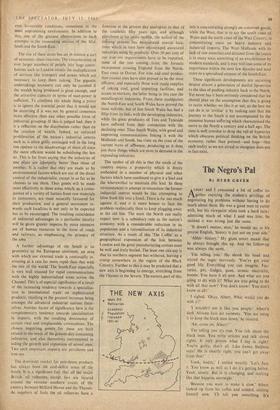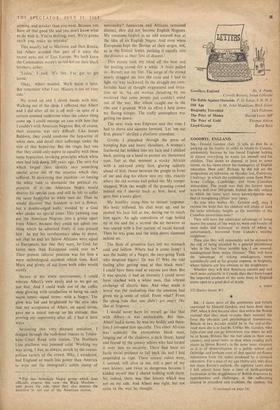The Negro's Pal
By HERB GREER
ALBERT and 1 consumed a lot of coffee to- Agether enjoying the student's privilege of negotiating big problems without having to do much about them. He was a good man to yatter with, but his viewpoint often took a hard turn: admitting much of what I said was true, he insisted it was wrong just the same.
'It doesn't matter, man,' he would say in his precise English, 'history is just not on your side?
'Aithh—history.' My glum retort meant that he always brought this up. And the follow-up was always the same.
'I'm telling you.' He shook his head and stirred the sugar nervously. 'You've got your good life. Everything you can imagine. Fac- tories, jets, .fridges, guns, atomic electricity, bombs. You have it all now. And what are you going to do with it? What are you going to do with all that now? You don't know ! You don't know at all!'
1 'sighed. 'Okay, Albert. What would you do with it?'
'1 wouldn't use it like you people.' Albert's dark African face set earnestly. 'You are using it to keep the black man down,' he insisted.
`Aw, come on, Albert!'
'I'm telling you it's true. You talk about the black man. You write articles and talk about rights. It only proves what 1 say is right! You're guilty, that's all. Like James Baldwin says! He is exaetly 'right, you can't get away from that!'
'Look, buddy,' I smiled wearily. 'Let's face it You know as well as I do its getting better. Yeah, slowly. But it •is changing, and nothing like that happens overnight.'
'Because you want to make it slow.' Albert looked up from his coffee and nodded, smiling himself now. 'I'll tell you something. It's coming, and quicker than you want. Because you have all that good life and you don't know what to do with it. You're drifting, man. We're gonna catch you; make no mistake.'
This usually led to Marxism and then Russia, but Albert avoided that part of it since the recent news out of East Europe. We both knew the Communists weren't so red-hot on their black brothers, either.
'Listen,' I said. 'It's late, I've got to get home,'
'Okay,' Albert nodded. 'We'll finish it later. But remember what I say. History is not on your side.'
We stood up and I shook hands with him. Walking out of the shop, I reflected that Albert and I did after all hit it off well--in spite of a certain strained. undertone when the colour thing came up. I could manage an ease with him that I couldn't with American Negroes. But, of course, their situation was very difficult. Like James Baldwin, they could condemn the hypocrisy of white men, and detail their sufferings under the rule of that hypol:risy. But the tragic fact was that they could only aspire to equality with these same hypocrites, invoking principles which white men had laid dowp 200' ■ ears ago. The very fire which forged their identity into something special arose out of the injustice which they suffered. In destroying that injustice----or forcing the white men to dismantle the political ex- pression of it-7-the "American Negro would destroy his Special case, and still be left to suffer the *same hypocrisy as white men do: Then he would discover that freedom is not a , flower, but a double-edged knife, wielded by a God who abides no special cases. This yawning trap put the American Negroes into a group apart from Albert, because they could not admit one thing which he admitted freely if you . pressed him: he put his revolutionary ideas to prove, not that he and his fellow Africans were equal to Europeans, but that they were, by God, far better men than Europeans could ever be.* Their present inferior position was for him a mere technological accident .which time, Karl Marx and plenty of aid from both sides would, rectify. .
Secure in my white environment, could
tolerate Albert's view easily and so we got on just fine. And. I could walk out of the coffee. shop glowing with satisfaction at being on such warm terms—equal terms--with a Negro. The glow was fed and brightened by the .pice . idea that my acceptance of Albert, on equal; terms, gave me a moral one-up on his attitude, thus proving ,my. superiority after all. I had it both ways.
Savouring this very pleasant sensation, I dodged through. the rush-hour masses in Totten- ham Court Road tube station. The Northern Line platform was jammed solid. Working my way along, I was, as always, struck by the cosmo- politan variety of the crowd. Why, I wondered, had England so much less power than America to wipe out the immigrant's subtle stamp of
*The one American Negro group which does officially express this view—the Black Muslims— only prove the rule, since they also express the intention to opt out of the American nation. nationality? Jamaicans and Africans remained distinct, they did not become English Negroes. My emotions tingled in an odd amused way at the idea of an English Negro. And even white Europeans kept the flavour of their origin, not, as in the United States, pushing it rapidly into the distance as their 'line of descent.'
This puzzle took my mind off the heat and the jostling crowd for a while. A train pulled in—Barnet, not my line. The surge of the crowd nearly dragged me into the' train and I had to fight my way backward. In the struggle my com- fortable haze of thotight evaporated and irrita- tion set in. An old woman thrashing by me muttered that some people just couldn't stand out of the way. Her elbow caught me in the ribs and I grunted. With an effort-I held down my flaring temper. The stuffy atmosphere was getting me down.
The next train was Edgware and this time I had to shove and squeeze forward. 'Let 'cm out first, please!' shrilled a platform attendant.
Grimly I ploughed through the press of bumping hips and heavy shoulders. A woman's feathered hat bobbed into my face and I ddcked back, putting up a hand to protect my threatened eyes. Just at that moment a stocky African with a red-eyed jowly face, glaring sullenly ahead of him, thrust between the people in front • of me and dug his elbow into my ribs, exactly where the old woman had poked me. My temper snapped. With the weight of the pressing crowd behind me I shoved back at him, hard, and gave him a nasty glare.
My hostility stung him to instant response. His 'body stiffened, his chin went up, and he pushed his face full at me, daring me to touch him again. An ugly convulsion of rage boiled Op in me and for a se;:ond the air between us was seared with a live current of racial hatred. Then he was gone and the train doors slammed behind me.
The flash of primitive fury left my stomach cold and hollow. Where had it come from? I was the buddy of a Negro, the easy-going Yank who despised bigots! Or was 1? Why the odd feeling after getting mad at that black man? I could have been Mad at anyone just then. But it was special, it had an intensity I could never have reached with a White man, that vibrant exchange of electric hate. And what made it Worse was the realisation that the emotion had given me a. sense of relief. From what? From the smug rule that one didn't get angry, like that at Negroes.
I would never have let myself go like that with Albert—it waS • unthinkable. But then, Albert had'. ia 'name, he was my buddy and there- fore" tolertiled him specially. This other African was suddenly the anonymous black man, lunging' out of the shadow S; a 'dark threat, hated and feared by the uneasy whites who had lorded
.
it over him so .securely. There had been no facile social pretence to fall back on, and I had responded to type. These uneasy rulers were, it seemed, still alive in me, still a part of ray own history, and twice as dangerous because I kidded myself that I shared nothing with them. So, indeed, there was that history which was not on my side. And Albert was right, but not quite in the way he thought.



































 Previous page
Previous page